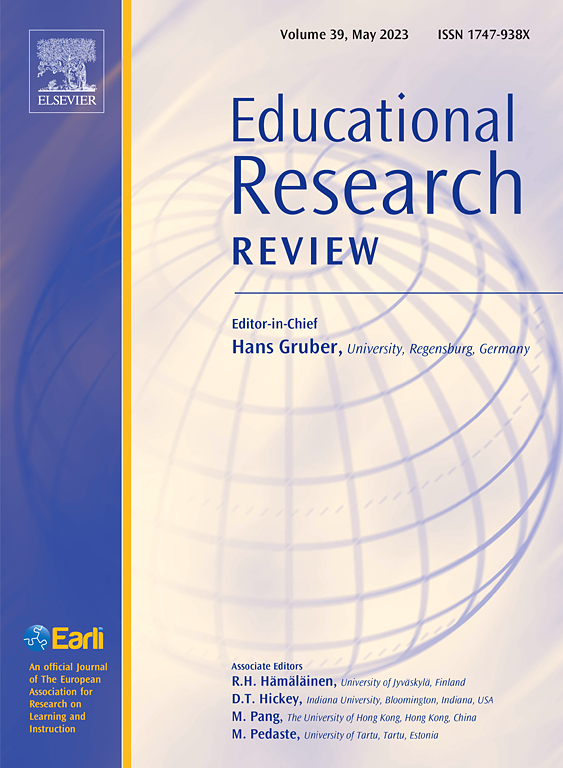Measuring spelling skills: A meta-analysis of the convergence of dictation and error detection tasks
IF 10.6
1区 教育学
Q1 EDUCATION & EDUCATIONAL RESEARCH
引用次数: 0
Abstract
Accurate spelling is essential for academic and professional achievement. Developing cost-effective assessments to provide early support for children experiencing difficulties with spelling is crucial. In the past, dictations have been the primary method for measuring spelling skills. However, given that reading and spelling rely on shared orthographic knowledge, detecting spelling errors might serve as a more efficient assessment approach. Recently, passive formats have gained prominence such as error identification tests or multiple-choice formats, which can be administered digitally. This study aimed to examine the relationship between active and passive methods of spelling assessment in a meta-analysis while examining potential moderators. A multilevel meta-analysis was conducted, utilizing 27 studies with 69 samples and 113 correlations. A strong positive overall correlation of = .77, 95 % CI [.74, .80] was found. Stimulus material and various forms of active and passive methods for assessing spelling skills significantly influenced the relationship as moderators, whereas grade level had no impact. No evidence of publication bias was detected. The positive relationship between active and passive methods of spelling assessment supports their interchangeable use in practice. As the number of primary studies increases, future meta-analyses could explore further moderators that may influence the strong overall correlation.
测量拼写技能:听写与检错任务趋同的元分析
准确的拼写对学术和专业成就至关重要。制定具有成本效益的评估,为拼写困难的儿童提供早期支持,这一点至关重要。在过去,听写一直是衡量拼写能力的主要方法。然而,考虑到阅读和拼写依赖于共享的正字法知识,检测拼写错误可能是一种更有效的评估方法。最近,被动格式得到了突出,如错误识别测试或多项选择格式,可以进行数字化管理。本研究旨在通过荟萃分析来考察主动和被动拼写评估方法之间的关系,同时考察潜在的调节因素。采用27项研究、69个样本和113个相关性进行了多水平荟萃分析。总体正相关= 0.77,95% CI[。[74, 0.80]被发现。刺激材料和各种形式的主动和被动的拼写技能评估方法显著影响了这种关系,而年级水平没有影响。未发现发表偏倚的证据。主动和被动拼写评价方法之间的积极关系支持了它们在实践中的可互换使用。随着初步研究数量的增加,未来的荟萃分析可以进一步探索可能影响强整体相关性的调节因子。
本文章由计算机程序翻译,如有差异,请以英文原文为准。
求助全文
约1分钟内获得全文
求助全文
来源期刊

Educational Research Review
EDUCATION & EDUCATIONAL RESEARCH-
CiteScore
19.40
自引率
0.90%
发文量
53
审稿时长
57 days
期刊介绍:
Educational Research Review is an international journal catering to researchers and diverse agencies keen on reviewing studies and theoretical papers in education at any level. The journal welcomes high-quality articles that address educational research problems through a review approach, encompassing thematic or methodological reviews and meta-analyses. With an inclusive scope, the journal does not limit itself to any specific age range and invites articles across various settings where learning and education take place, such as schools, corporate training, and both formal and informal educational environments.
 求助内容:
求助内容: 应助结果提醒方式:
应助结果提醒方式:


